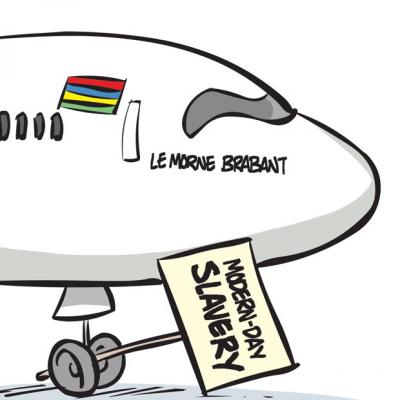Tuesday October 17 marked the international day for the elimination of poverty. There were events worldwide both to reflect on poverty and measures to eradicate an evil that brings a great deal of suffering. The world is becoming polarized as wealth is concentrated in the hands of a few, while millions go without a decent meal every day. The call to end poverty is noble indeed, but since 1987, when the first declaration was made, the plight of the poor has not improved and twenty-five years later following the resolution, glossy speeches are still being made, and the eradication of poverty seems so far away. Here, in Mauritius, Tuesday October 17 went almost unnoticed. Those who advocate for the poor, reminded us the need for social and economic changes. Poverty did not make the headline locally, but the hunger strike by the cleaners caught attention, and the arrival of the Airbus 350-900, seemed more worthy and important, than those on starvation. One might say, it was a week of cynicism.
The hunger strike by the cleaners confirms the disparities that exist in Mauritian society. There is extreme inequality of wealth and resources and the global trend of the rich getting richer and the poor getting poorer is also evident in Mauritius. The case of the cleaners also confirms exploitation. Those who shop in the shopping malls probably think little of the women on strike, but to think that many families are still trapped in poverty in unthinkable in modern Mauritius.
Last week Divali, the festival of light was also celebrated across the world. This festival that reminds us of hope, courage, strength and the ultimate defeat of evil indeed gave a lot of courage and strength to fight for justice, peace and equality. For the women cleaners, along with millions, who are hoping for a better life, the festival of light was a renewal call.
Then the Airbus 350-900 landed in such pomp and ceremony. Air Mauritius is caught in its own turbulence. Whether one calls it an internal power struggle or unsatisfied personnel, the airline has been going through some troubled times. Many airlines have gone bust due to severe competition, mismanagement and strict government regulations, the national carrier is walking on thin ice. While the country brags itself for landing the first Airbus 350-950 in the Indian Ocean, Air Mauritius is gearing up for harder times ahead. Whether the landing of this aircraft was a political distraction away from the hunger strike, the reality is that the week was marked by cynicism.
While the battle for control at Air Mauritius takes new heights, the women on hunger strike have raised some serious questions and as the new session in Parliament is about to begin, the reaction will be loud. First of all, is there a genuine desire to eradicate poverty in the country, and if so, what measures are being taken to deal with it? Leading on to the next question is, is there a coordinated effort to examine the causes of poverty? Irrespective of one’s political convictions, poverty is a sin, therefore, it has to be eliminated.
More than 122,000 people or 30,000 families live in poverty in Mauritius. This is very high for a middle level income economy. If one uses salary as a scale, then at least 25% of the population are in poverty. The World Bank recognises that poverty in Mauritius is the result of job insecurity, lack of affordable housing and access to education. Mauritius is also a country of debt, and many families are engulfed in it. Some regions in the south and west parts of the island have inadequate supply of water and electricity. These pockets of underdevelopment are rarely mentioned in the country’s development plans. Patricia Adèle-Félicité, of Caritas, speaks of the social deprivation and the low salary that throw many into the cycle of poverty. What many fail to understand is that a woman earning Rs 7,000 a month may not be classified as “poor”, but if she has a family with four children, the equation changes drastically.
The women cleaners on hunger strike therefore have taken the fight for an acceptable salary forward. It is unacceptable that 25% of the population could be pushed into poverty because of the low salary they earn. Poverty breeds other social problems such as drug addiction, alcoholism, prostitution, and school drop-outs. Those who cannot afford a decent meal or proper clothing are forced into the fringes of society. I have spoken about a society at risk, and its consequences. It is not enough to build a few houses here and there and claim that there is no housing problem in the country. By the same token, the creation of a few jobs should be seen as a celebration. More importantly, it is about decent jobs with a decent salary that allows people to lead a decent life.
The week that marked the International day for the Elimination of Poverty should have been a moment of reflection and action. In the spirit of Divali, the women cleaners have made their point, and they deserve better. The celebration of the Airbus 350-900 should not have taken the agenda away from those who are speaking out against poverty, inequality and injustice. The cost of one such aircraft could alleviate a lot of suffering. If it is a question of priorities, mine goes to those who are in distress. People need food, shelter, clothing and health care. If these needs are met properly, then we can think of other priorities.
POVERTY, HUNGER STRIKE AND THE ARRIVAL OF THE A350-900: A week of cynicism
- Publicité -
EN CONTINU ↻



